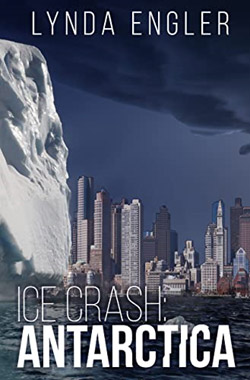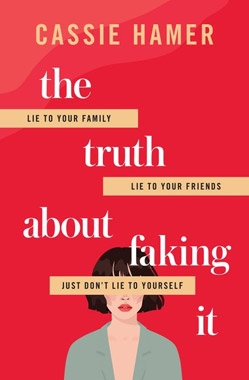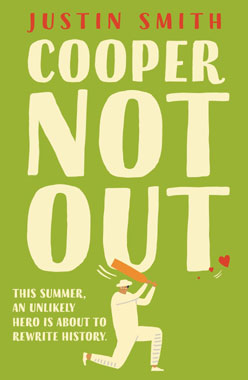Showing all posts about writing
Ice Crash: Antarctica, Lynda Engler
11 February 2022

American science fiction author Kim Stanley Robinson is among writers who are hopeful fiction featuring climate change, and the consequences of global warming, will play a part in changing the perceptions of people who still don’t take the worldwide environmental crisis seriously.
For instance his latest novel, The Ministry for the Future, paints a bleak picture of a planet in deep trouble, but also presents a pathway through the turmoil, towards a positive future. Ice Crash: Antarctica (published by Amazon, February 15, 2022), by North Carolina based American author Lynda Engler, is another work of fiction taking on the topic of climate change, coupled with a series of devastating natural disasters.
Here, an earthquake in Antarctica pushes the Thwaites glacier, also known as the doomsday glacier into the ocean, bringing about a sudden and catastrophic rise in sea levels. Kathryn, a seismologist working in Antarctica, who has been alarmed by the unusual seismic activity, becomes trapped at McMurdo Station, by a succession of earthquakes.
Her husband and son meanwhile, who are in Boston, and her daughter who is in Florida, need to evacuate as sharply rising sea waters, and a series of tsunamis, bring devastation to the continental United States, and other nations around the globe.
RELATED CONTENT
fiction, Lynda Engler, TBR list, writing
The Truth about Faking It, Cassie Hamer
10 February 2022

The first rule of lying is not be caught out. But to lie frequently, or compulsively, means you either need to have a good memory, or hope that no one ever uncovers the truth. And webs of deceit are at the heart of The Truth about Faking It (published by HarperCollins Publishers, May 2022), the third novel by Sydney based Australian author Cassie Hamer.
Lies run through Ellen’s family. Her daughter Natasha, a composed television news reader, and grand-daughter Georgie, the producer of a reality TV show, are accomplished at concealing the truth, and their feelings. Ellen isn’t half bad either. Despite being married to David, she has been seeing the well-off Kenneth, on the side. But when the accident prone David dies in a boating accident in Thailand, having travelled there with his elusive and seldom heard of brother, Ellen, Natasha, and Georgie, smell a rat.
Something is not quite right about the whole affair, and the three women decide to delve further into the circumstances surrounding David’s demise. But in doing so, in exposing the truth of what happened to David, they risk lifting the lid on their own sordid lies and deceptions. Oh what a tangled web we weave, when first we practice to deceive…
RELATED CONTENT
Cassie Hamer, fiction, TBR list, writing
A day in the life of a librarian
9 February 2022
A day in the life of a librarian, or at least how library users might see a librarian’s day, by Chicago based American author John Howard Matthews. Quite possibly not one hundred percent accurate…
RELATED CONTENT
The impact of COVID lockdowns on new authors
7 February 2022
Newly published authors are among those whose livelihoods have been impacted by the COVID lockdowns of the last two years, writes Mark Rubbo, managing director of independent Australian book retailer Readings. Bookshop exposure is integral in building an author’s profile, and is something many new authors have missed out on recently, with people staying at home because of restrictions imposed as a result of the pandemic.
For most first-time authors, exposure in bookshops is very important in establishing a market for a book, be it a chance encounter, a recommendation or a purchase triggered by some form of publicity. If the book is any good, then word of mouth builds a more sustainable demand. Many of the books released in the past two years risk becoming Covid orphans.
RELATED CONTENT
Cooper Not Out, by Justin Smith
1 February 2022

It’s a funny old game cricket, some days a player’s skill sees them soar to heights not seen before, other day’s fortune roundly turns on even the best. Then there’s Roy Cooper, a police sergeant who’s been a member of the rural Australian Penguin Hill Cricket Club for years. He’s never scored a century, nor for that matter, gone much passed double figures.
Nor has he ever taken a wicket, let alone a hat-trick, or a ten wicket haul. But as local schoolgirl Cassie Midwinter discovers, Roy has a claim to fame, one seemingly overlooked by the statistics mad doyens of the game: he has not once been dismissed while playing. After decades at the crease, Roy has never been bowled, stumped, caught, nor run-out.
It is a feat Cassie brings to the attention of a renowned cricket writer known as Don Garrett, who thinks the national men’s cricket team could benefit from Roy’s talents. Australia are being trounced by the West Indies in the 1984 summer test series, and Don sets about bringing Roy’s achievement to the notice of the team selectors, in Cooper Not Out (published by Penguin Books Australia, 18 January 2022), by Melbourne based writer and journalist Justin Smith.
Will the unthinkable happen? Will a life-long club player find himself pacing onto the pitch at the Melbourne Cricket Ground, in a bid to reverse the fortunes of the men’s test team? It might seem like a pipe dream, but as they say, it’s a funny old game. But Roy isn’t the only one with unnoticed accomplishments, and there’s much more to Don, the sports writer, than meets the eye.
RELATED CONTENT
fiction, Justin Smith, TBR list, writing
Copyright Agency-UTS New Writer’s Fellowship 2022
31 January 2022
Applications are open for the 2022 Copyright Agency-UTS New Writer’s Fellowship, an initiative co-hosted by the Copyright Agency, and the University of Technology, which aims to assist Australian writers working on their (sometimes difficult) second or third novel. The fellowship helps cover a writer’s living costs for a year, allowing them to focus on their manuscript.
Australian writers are now invited to apply for this residency for 2022. It is well known that completing a second or third book is often difficult. This unique opportunity provides a writer with the financial security to complete a new work, to take creative risks, and to connect with Australia’s leading creative writing program.
Previous recipients include Bri Lee, Fiona Wright, and Christopher Raja. Applications close on Monday 21 February 2022.
RELATED CONTENT
Adelaide Writers’ Week 2022
31 January 2022
Adelaide Writers’ Week is on in the South Australian capital from Saturday 5 March, until Thursday 10 March 2022. Australian and international authors, including Michael Mohammed Ahmad, Lur Alghurabi, Anuk Arudpragasam, Hannah Bent, Trent Dalton, Michelle de Kretser, and Charlotte Wood, are among those participating in person, or online.
RELATED CONTENT
Wheeler Centre Hot Desk Fellowships 2022
28 January 2022
The Wheeler Centre, in conjunction with The Readings Foundation, are offering twenty-one fellowships to emerging writers, and a playwright. Recipients, known as Hot Desk fellows, will receive a thousand dollar stipend, and the use of a workspace at the Melbourne based Wheeler Centre for ten weeks, to work on their writing projects.
Hot Desk fellows will also have the opportunity to meet, network and work with the Wheeler Centre’s resident organisations including Writers Victoria, Emerging Writers’ Festival, Australian Poetry, Express Media, Small Press Network and the Melbourne Writers Festival. In addition, Hot Desk Fellowships introduce emerging writers and their work to the public – we will feature all our writers and their projects on our website, as well as in a special Hot Desk Edition of The Next Big Thing series.
Applications for the fellowships are open now until Monday 28 February 2022.
RELATED CONTENT
2022 Text Prize entries open
26 January 2022
Entries for the 2022 Text Prize, an award for the best unpublished manuscript by young adult and children’s writers, are open until Monday 21 February 2022.
Works of fiction and non-fiction from authors both published and unpublished can be submitted, with the winner receiving a publishing contract with Melbourne based publisher Text Publishing, and a ten-thousand dollar advance against royalties.
Applications are also open for the Steph Bowe Mentorship for Young Writers, a Text Publishing initiative to encourage the work of writers under the age of twenty-five. The mentorship honours the work of late Australian young adult author and blogger Steph Bowe, who died in 2020.
RELATED CONTENT
literature, Steph Bowe, writing
What do Australian authors earn? Not a lot
24 January 2022
Writing can best be described as a labour of love, if the results of the most recent Australian Society of Authors (ASA) member survey is anything to go by. If you plan to be in it for the money, think again. If the minimum annual wage in Australia is about forty thousand dollars, most writers are making less than half of that.
- 81% earned less than $15,000 in the last financial year
- 58% of the total respondents earned between $0 and $1,999 from their creative practice
- 58% of full-time writers/illustrators reported earning less than $15,000
- 25% [of full-time writers/illustrators reported] earning between $0 and $1,999
Authors can apply to a number of agencies for funding, though there isn’t a whole of money available to begin with, and the process can be best described as competitive. The survey found over fifty percent of authors had not applied to bodies such as the Australia Council, or the Copyright Agency, since the beginning of January 2020.
RELATED CONTENT
